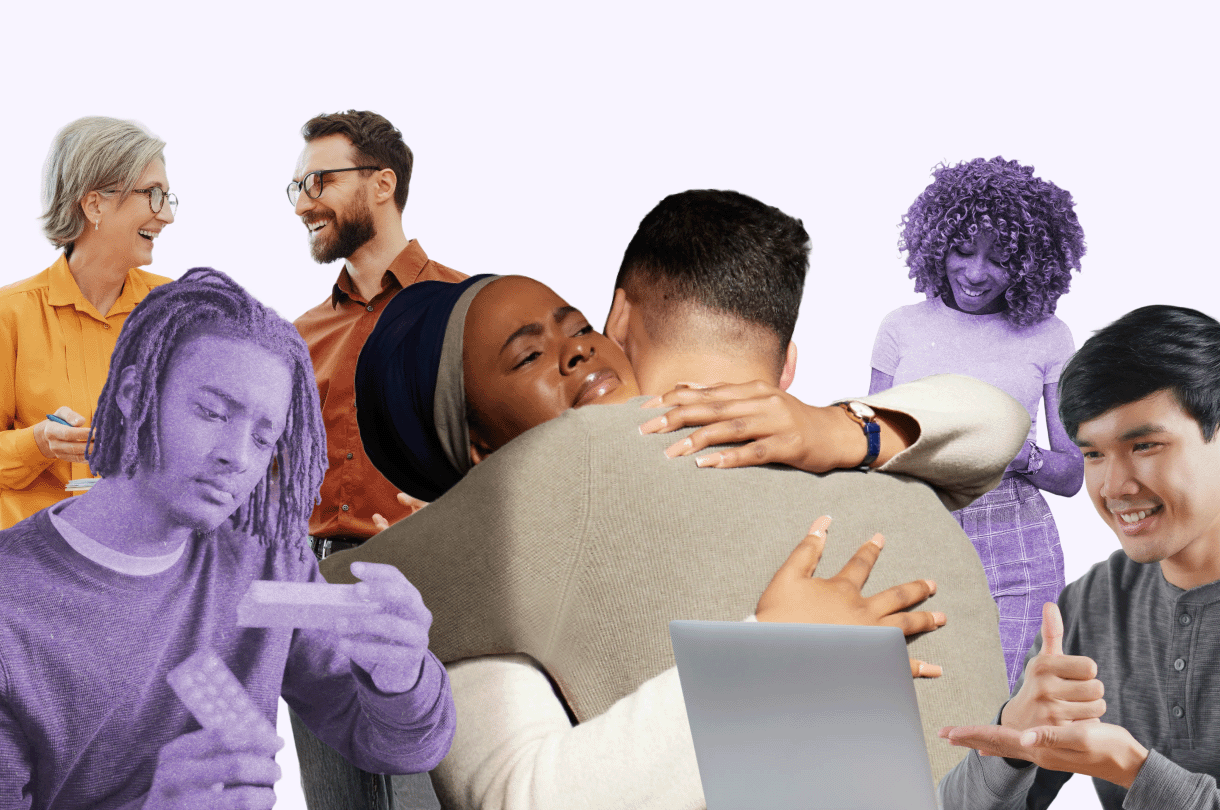In January, Spring Health launched our very first Employee Resource Groups. Shortly after, our Black Employee Coalition committed to a month-long celebration of Black History Month, sharing articles and facts internally each day.
Our theme was Black health and wellness, and as the culmination of our celebration, we had the honor of hearing from two talented trailblazers in DEI and health equity. They talked about the impactful work they’re doing and how they’ve prioritized their own mental health along the way.
Getting to know our panelists
Dora Clayton-Jones, PhD became a registered nurse because she didn’t see a lot of providers who looked like her, and wanted to change that. She transitioned into teaching, and is now an assistant professor at Marquette University in the College of Nursing and an adjunct faculty member at the Medical College of Wisconsin.
Dr. Clayton-Jones is currently the president of the International Association of Sickle Cell Nurses and Professional Associates (IASCNAPA), and leads a multidisciplinary research team investigating health care transition from pediatric to adult care among young adults living with sickle cell disease. This disorder disproportionately affects people of African descent.
Scott Morris is a Global Diversity and Inclusion Initiatives Strategist at 3M, where he has worked for 33 years. Scott credits his work around inclusion to his parents and grandparents, who instilled in him the importance of always competing to be your best—but not at the expense of other people.
Elevating impact
When Scott first asked himself how he could inspire others and what kind of impact he could have on his own, he quickly decided that wouldn’t be enough. So he started looking at the impact his department at 3M could make, and what they could do collectively.
Scott says, “Equity is an elusive thing. Black folks weren’t working in corporate America until the 1970’s, so there’s a lot of catching up to do.” Spring Health’s Associate Chief of Staff D'Andrala (DeDe) Alexander and Senior Clinical Manager Lisa Lyman, LPC led this powerful discussion about DEI strategies and Black health and wellness. Here are some of the key takeaways.
DeDe: Can you both speak to health equity and how your work impacts that?
Dr. Clayton-Jones: When we think about what determines health, biology and genetics contribute to about 10%, physical environment contributes about 10%, clinical care contributes about 10%, and health behaviors about 30%—but the place to really have an impact is through social and economic areas.
Everything we do, we do to advance health equity from a clinical and educational standpoint, but we also have to simultaneously address the determinants of health: the structural racism, the barriers, the lack of access, and the under-resourced communities.
Scott: At every level, wellbeing is more important today than it's ever been before. We’ve been stacked with social unrest, AAPI, and folks living with anticipatory grief. After the events of George Floyd’s murder and the social response that came from it, things shifted in a big way. We started having conversations around race, and I facilitated about 90% of those conversations with our entire enterprise. It was important to me to create a safe space for people to speak, share, and be vulnerable. Our majority shared, oftentimes in tears, trying to figure out, ‘what can I do next?’ Something was different with George Floyd, because we were sitting in our homes, dealing with anticipatory grief. Our hearts were wide open, and when everyone saw [his murder], our hearts were activated and the chance for empathy was there. These conversations are happening, but beyond the conversations, I’m excited to say that transformational action is following.
Lisa: How have you taken care of yourselves through the trailblazing process and all the traumas and challenges you may have faced? How do you protect your own wellbeing?
Scott: Something I did when the pandemic started is [become] more vulnerable, which helped me understand and feel things in a way that I hadn’t before. Maybe for the first time, I started focusing on myself differently than I have in the past. I also [focused on] discerning happy and joy. Those are two very different things. Happiness is transactional, joy is systemic and sustainable. When you’re in a pandemic and can sit and reflect for two years, a lot of things start to crystalize. I want to build muscle around feeling healthy, and then discern the transaction, which is happiness, to aspire to feel joy in my life and lift others along the way.
Dr. Clayton-Jones: My faith is always something I rely on, and it’s certainly developed in ways that I didn’t anticipate over the years and with the pandemic. I’m really intentional about investing in self care, and I encourage that among my students and the advisory boards I’m a part of. I will start the conversation with, “what have you done to invest into your self care?” After we accomplish a huge project, I’ll say okay, let’s celebrate and then do something good for yourself. I think we need to be intentional about self care, especially when we’re in positions where we’re serving our communities, families, [and employees]. Something else I’ve been encouraging is approaching a conversation as meaningful, instead of difficult. That way, we’re not limiting the dialogue and healthy exchange that can take place. I consider this part of my wellness as well. I’m intentional about how I preface conversations and what I include on agendas so they’re meaningful for everyone, and no one comes into a conversation rigid and stressed. We have to be better about making our conversations meaningful and inviting people in, so they know they can listen to be understood and speak to understand.
DeDe: What are the next steps for us, as individuals and organizations, to create change in the world?
Scott: The starting point is to get grounded in your purpose, why you’re here, and what impact you want to drive. What type of transformative, measurable change are you going to bring forward? Once you’re able to articulate that, you can start bending into it in a way you didn’t think you could. Think about your purpose, how intentional you’re going to be around that purpose, and how you’re going to prioritize to make that happen. To me, that’s foundational if you’re looking to be transformative, a player that’s relevant and can truly make a difference in the spaces around health equity.
Dr. Clayton-Jones: I believe that everybody needs a strategic plan. But before that, we need mental health awareness, and most importantly, to be self aware and to engage ourselves in what I call reflective action. If we can be comfortable with disrupting the inequities and structural processes that perpetuate racism, then everything we learn will help us with other challenging disparities. It’s important that we understand our interconnectedness among one another, and recognize that the entire community is being held back by health inequities—it doesn’t just affect some, it affects all of us. The vicarious trauma that we witness affects all of us, across the lifespan. If we can find an area to focus on, and develop some strategies and some action around that, with some measurable goals and objectives, then we’re headed in the right direction.
Read this blog next for three powerful ways HR leaders can elevate Black mental health in the workplace.













.png)
























